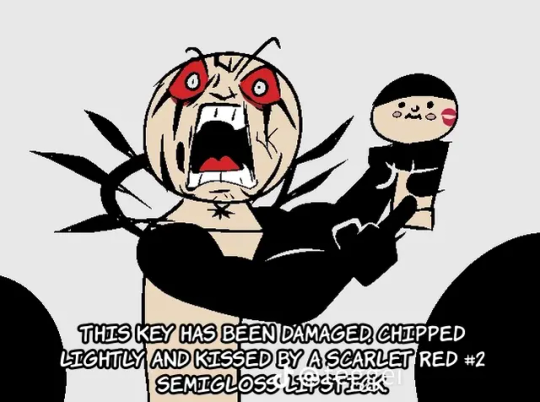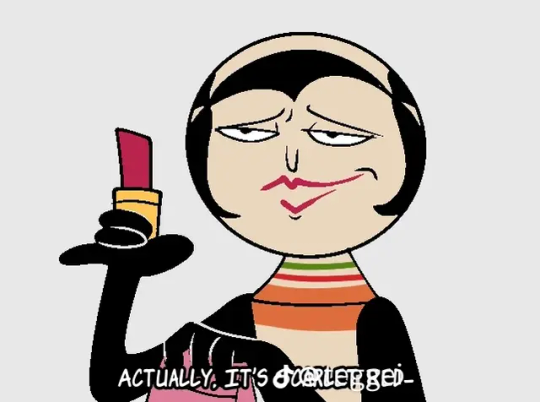#engacho
Explore tagged Tumblr posts
Text
SpongeBob reference

Engacho: THIS KEY HAS BEEN DAMAGED, CHIPPED SLIGHTLY AND KISSED BY A SCARLET RED #2 SEMIGLOSS LIPSTICK

Daigorou/Kenichi: Actually, it’s scarlet red #3-

21 notes
·
View notes
Text


^^
41 notes
·
View notes
Text
Idc who says what.
I'm him↓










"Are you just gonna assume that you're relate to every character who are bastards or villans?"
Yes.
Because I am THEM-
He's so me bro like wtf-
#atgw#as the gods will#Engacho#as the gods will kokeshi dolls#kokeshi#as the gods will engacho#atgw engacho#xp ranked!!!11!!!1!
28 notes
·
View notes
Text





Yall are gonna HAVE to hear me out on this one....🙏
62 notes
·
View notes
Text

ENGACHO CHILL!!!!! (ft. Daigorou, who i will not tag as there isn’t enough of him in here)
#as the gods will#gods will kokeshi#kamisama no iu toori#gods will fanart#my art#kobayashi tarou#engacho
26 notes
·
View notes
Text
OC X CANON !!!
engacho x yuri


Extra :3:



14 notes
·
View notes
Text
Lucilius and Belial are in Grand Blues for the third time this year, I'm officially Assuming The Best!! (Even as Lucilius is planning for the worst XD)

That gesture he's making is I believe "engacho" (?), which according to Nihongo Master here and Pixiv's dictionary here is part of a gesture done in Japan when people, especially kids, see something repulsive. Shot down again~!
Seriously Belial, cut your losses already and find someone who wants you, I have a whole list of possible options that totally aren't self-indulgent or biased
17 notes
·
View notes
Note
WHO IS YOUR FAV KOKESHI FROM AS THE GODS WILL? MINE IS KENICHI:33
Engacho all the way broski >:3
7 notes
·
View notes
Text

Ann (Engacho x Canon oc)
@didsomebodysayjusteat isn't she a cutie patodie? <:3 (I CRIED WHILE MAKING HER LOL)
5 notes
·
View notes
Text

Dancer in the Puddle | Artist: Rui Tomono
Story 1 Hina Kagiyama is a god that stores misfortune. She is what is known as a pestilence god. She apparently stores misfortune to prevent it from befalling humans.
Story 2 A taboo is something that should not be touched on or talked about. Hina has a number of taboos: "even if you saw something, pretend that you didn't," "never walk the same path twice," and "never bring up a topic of conversation."
Story 3 Nagashi-bina, or doll floating, is said to be the precursor for Japan's current day Hinamatsuri, or Doll Festival, in which girls are wished long and healthy lives. Hina collects all the misfortune-bearing dolls that are sent floating down a river by humans. This has apparently led to Hina's house being filled wall-to-wall with dolls…
Story 4 Hina herself harbors no ill will, but both humans and youkai are said to suffer misfortune simply by being near her. If you ever happen to accidentally violate one of her taboos… you should ward yourself against bad luck by crossing your fingers and shouting "engacho!"
Story 5 Believing in misfortune is a sort of faith. Gods prioritize these spiritual beliefs over any materialistic offerings. Apparently, Hina has a friendly and sociable personality. She often travels to the Forest of Magic to have fun and make dolls together with Alice and Medicine.
19 notes
·
View notes
Note
I LOVE THE KOKESHIS THEY ARE MY SILLIES ;] I love the ship Kenichi and Tarou as well. WHAT is ur favorite ship? Shit. I love Them with Engacho,as a Dad in ATGW my favorite au and lil kid murderers 🩸🔪
TAROU AND KENICHI :)
I LEOV THEM ALL I LOEV THE MIVIE AND HEGRGRGRGRGRR FR RGRG FINALLY SOMEOEN ELSE IN TRH SFANDOM HEGEHHEHARWREGWHEHEHHWHE
13 notes
·
View notes
Text
creo que voy a estar soltera toda mi vida y aunque no me agobia si tengo como un poco de duelo por la vida compartida que quiero y no voy a tener tipo le he gustado a otra gente y he tenido relaciones cortas pero obviamente e problema soy yo porque no me engacho con nadie que no sea no se namjoon de bts (totalmente inalcanzable al menos que me ponga en mis mejores trapos)
5 notes
·
View notes
Text
Me as a kokeshi doll, because I wrote a fan of the as the gods will/kokeshi manga lore of myself lol

It was harder than I thought (it has multiple teeth btw, that's why the mouth look like that-)
The fan lore:
Me (XP) used to be a person in that hospital with the bunch of other people who some years ago who try escape and live, and then I be used and left behind alone by that group for a sacrifice so the kokeshi dolls be busy while they run, and you know I got killed by Engacho because there were no one to hold hands, and turn into that wrapped kokeshi dolls, but the difference was that I came out still alive but as that kokeshi doll I am now, just a little smaller than the other kokeshis because they probably more grown adults-
What I do:
I either help the humans who try escape or help the kokeshi dolls to catch them, but it's all up to my choice, I can either snitch on where the human is or tell nothing, or be helpful to kokeshi dolls or trick them for fun, it has no between, me helping or betraying is up to my own choice and all it left is the humans to pray and dolls to hope that I'll be useful to them
Lol I'm basically a bastard by choice in that fan lore >:3
11 notes
·
View notes
Video
youtube
【7回目】ゲームコレクター・酒缶はバカゲー?グロゲー?実はワキゲーでえんがちょなあのゲームをクリアできるのか!?【Engacho!】 #令和六年...
0 notes
Text





[Engacho!] / Nihon Application / 1999
2 notes
·
View notes
